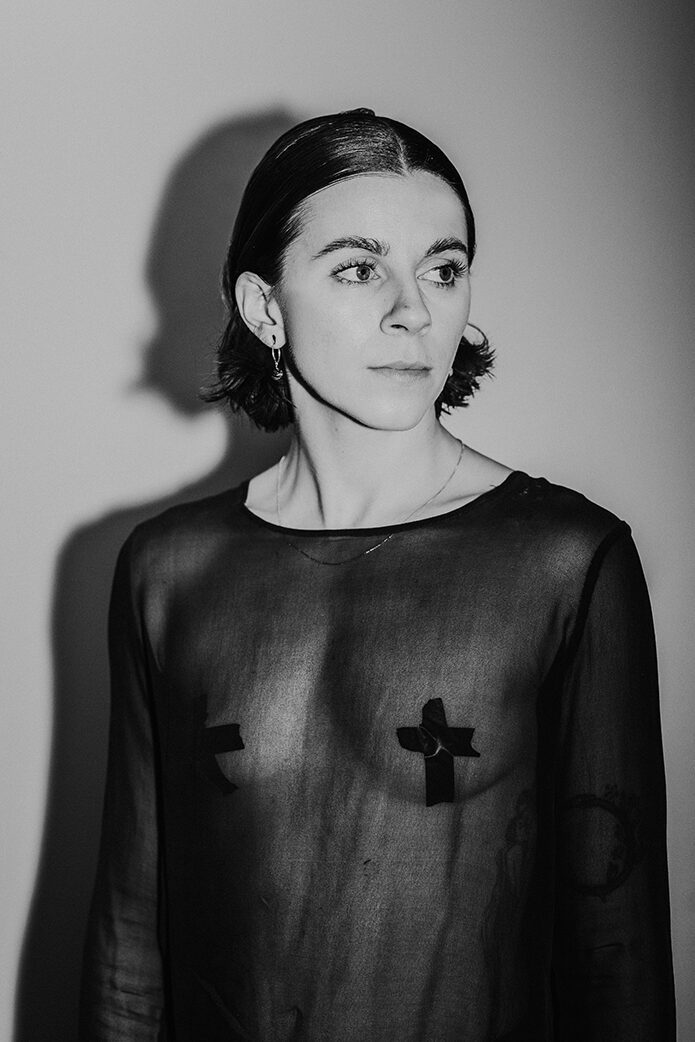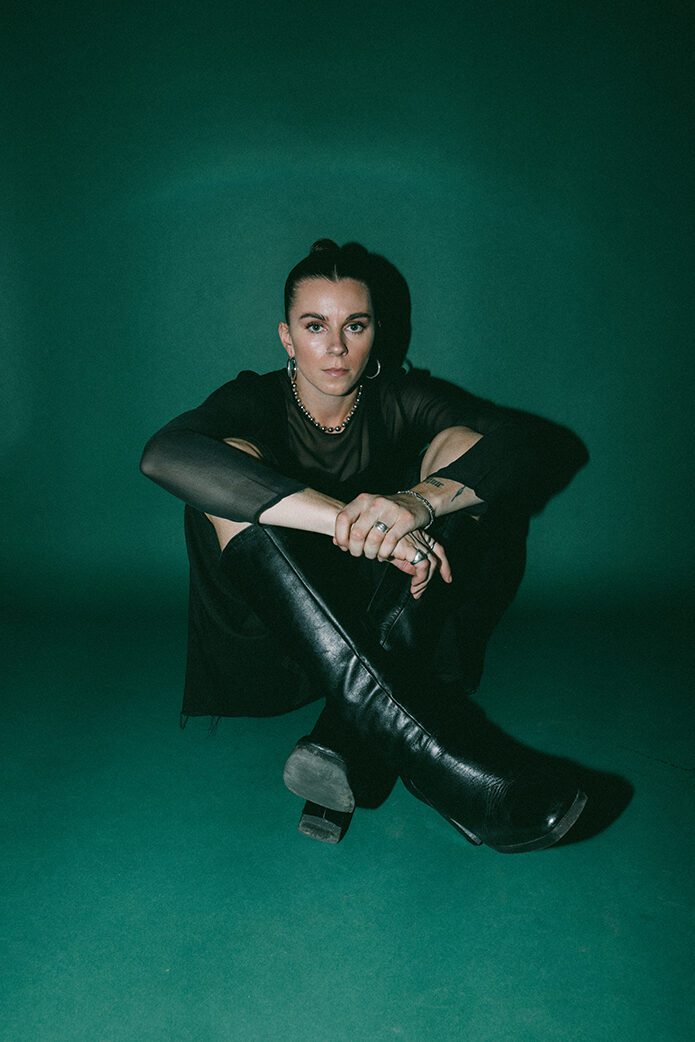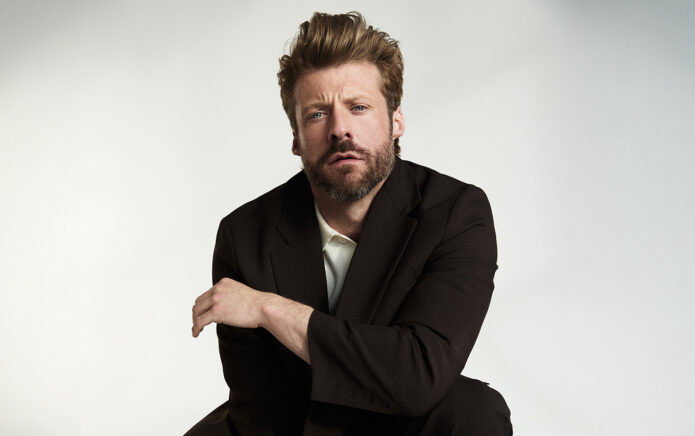
A year ago, Lynn Gunn wanted to call it quits. After weathering through vocal problems on tour and an uncertain fate at their former label, the alternative singer-songwriter began questioning how invested she was in being an artist. “I was ready to quit music or quit PVRIS and start something else to be totally honest,” Lynn says from the GAY TIMES office. A decision to discard the “baggage” of being a band wasn’t a light call from the singer. PVRIS, for many, was foremost known as a tight-knit trio that pushed the presentation of synth rock music. So, as Lynn Gunn reflected on the 10 years she had poured into the PVRIS project, she decided to move ahead with “full throttle” ambition and “fuck it up”.
As Gunn refused to neglect the legacy of PVRIS, she sensed change was necessary for survival. In October last year, the artist signed to Hopeless Records which earmarked a new era for the alternative outfit. “We had quite an experience on our last label and that is all I can say,” she says diplomatically, smiling. “There was lots of learning there of things we do not want. We were independent for a second and held at a standstill though not from our end.”
The transition from collective to solo act was a culmination of hard work. For years, Gunn had existed as the creative force behind PVRIS’ murky on-stage moniker. Dark pop albums were penned with her battles with depression, self-questioning and queerness. So, with three accomplished albums under PVRIS’ banner and no clear path in sight, Gunn switched to cold calling industry friends for advice, hoping for some clarity in the industry chaos. It wasn’t until an incidental call with Eric Tobin at Hopeless Records that everything “made sense” for the singer. Since then, PVRIS has been resiliently reborn.
First finding their feet in 2012, PVRIS emerged in Massachusetts as moody alt-rock newcomers broaching the alternative community. It wasn’t until the band’s debut release, White Noise, that their brooding lyricism and slick emo-pop palette would stand out against a conventional scene of alt-pop. However, this wasn’t Gunn’s first project. The musician has found herself in the circles of a local metalcore band, Operation Guillotine, which predated her time at PVRIS.
Gunn’s seamless switch from heavy guitars to a gritty discography felt organised and better suited to her strengths. Over time, PVRIS’ growing credentials qualified them as curious contemporaries who have expanded the vein of alternative music. From playing the Van’s Warped Tour circuit to opening for Bring Me The Horizon and Halsey, PVRIS and Gunn have become measured markers of internal change in the industry.
“I’m not worried about what people are thinking anymore— it’s a rewrite and a redemption, almost,” the 29-year-old says openly. Following PVRIS’ 2020 monster album, Use Me, which included features from RAYE and 070 Shake, Gunn spent her time calibrating and considering her next steps. After a wave of vocal issues, the performer found herself struggling on stage and battling anxiety. “I had to get up on stage and pretend that it wasn’t happening. Internally, I was freaking out and not feeling confident at all, and wanted to run off stage. It was quite terrifying,” she tells GAY TIMES.
Gunn took time away from the stage to learn how to sing again – using new muscles and vocal techniques – to regain control of her voice. At a similar time to Gunn’s difficulty in the spotlight, a tightened focus fell upon the PVRIS’ and the singer’s move to go solo. “It was never really meant to be a focal point and then it kind of just became it,” Gunn clarifies. “Truly nothing has changed. Brian is still up on stage with me. We’re still goofing off backstage and having a laugh at everything. I was always comfortable with it behind the scenes and that’s kind of what my role was and what I was doing.”


The microscopic focus on women in music, particularly in alternative circles, isn’t uncommon. But, for Gunn, the constant prodding questions became tiresome. The justification, she says, it’s down to cultural conditioning. After a while, Gunn refused to “shrink” to fit the preexisting expectations around her. “There was always a shame to talk about it or to take that ownership, especially as a woman, in such a male-dominated space, especially in the rock world that we came up in,” she shares. “There’s such a strictness about camaraderie and seeing a band as just a band.”
Later, Gunn learned that her choice to move solo had a bigger knock-on effect than she could have imagined. “A lot of other bands that we’ve worked with, especially those with women in them, have started doing that as well, which has been really great to see,” she explains. “They said I inspired them to make that shift. People that were in my position felt like they could take ownership of that.”
In the latest PVRIS era, Gunn wants you to feel exactly how she did. “The title track (‘I Don’t Want To Do This Anymore’) encompasses the sentiment of where I was at in life and creatively,” she says. PVRIS’ new album flips the familiar synth-driven quirks we’ve come to expect from Gunn’s imprint. Tracks are melded with flairs of alternative electro-pop, introspective synths and guzzling guitars. “It’s the full context of PVRIS and the world and in music, but I felt this.” The singer retreats back into her thoughts, contemplating about her space in the scene as an out “queer woman in music”.
Gunn’s frustrations with music surfaced as she noticed the dichotomy between her art and the alternative queer-friendly culture she was creating against the “straight white” environment around her. “Coming to a PVRIS show you could see that’s not the world we live in and that’s not what the PVRIS universe is either,” she tells GAY TIMES. “I didn’t want to be lumped in with that anymore and I didn’t want to be a part of that scene and so I wanted to start new.” The “boiling point” for Gunn was the realisation that she had hoped for an opportunity for a clean slate. “I really wanted to kind start over and see if starting new would put a refresh button on everything and kind of separated us from that,” she explains. “In that same breath, I’ve put 10 years into this and built up such a great community and a fan base where people can feel this”.

While committing to PVRIS was no overnight decision, it’s not a direction Gunn regrets. As the rights and realities of everyday LGBTQ+ people began to change, the singer acknowledges that the PVRIS community is vital now more than ever. “The world is consistently changing and feels darker and gloomier. Especially for queer people. I’m still figuring it out,” she says. “My role is to give some fuel to people and proving some catharsis. There’s a lot of anger on this album, Evergreen, and that’s how I have been dealing with all this. I’m processing it and moving through it.
Gunn’s movement away from social media has also helped facilitate this. “I don’t think we’re supposed to function in systems that don’t support people like us. We’re seeing a lot of systems cracking, yet we’re still expected to walk through the world and do our job and do our role — it just feels unnatural.”
Evergreen’s album visuals feed into Gunn’s disconnect with social media and her relationship with reality. “The album’s visual representation feeds into both of those things. The internet feels like a very sterile stark white backdrop and void where you can put things in it,” she says. “Whereas real life, to me, feels vibrant with greenery; those visuals juxtaposition between the two became a through line for this album.”
Coming out on the other side of the new album, Gunn feels like a lot has been accomplished inwards and outwards. “Fast forward 10 years from where we started, a lot has changed for the LGBTQ+ community and our representation. I had a lot of deep shame about presenting as more masculine or not appearing as feminine,” she says. “I felt like leaning into that femininity would save me from backlash and help being embraced which feels silly. Now, on the other end of it, almost 10 years later, I feel very comfortable. I don’t really feel that pressure anymore.”


Stepping into the industry at a young age, Gunn admits “grappling” with the pressure of having to speak out about identity and presentation. “I don’t think that any artist in my position, or any artists who are representing a minority group, wants that pressure. Half the battle is getting up to be yourself and onstage and in front of people,” she tells GAY TIMES. “There was a lot of pressure in the past that I didn’t necessarily want or ask for but it was kind of placed on me which created so much anxiety around existing online and existing on any type of platform.”
As Gunn and PVRIS’ grew in notoriety, the singer noted how the band would receive attention solely for being queer. “Certain publications would reach out strictly because they wanted to interview an LGBTQ+ artist or what we’re thankful for at Thanksgiving. It was shit like that and it’d happen all the time,” she says.
“We don’t need to be sensationalised or have someone capitalise on it. It also feels different chatting with somebody who’s also queer. I know you’re waiting for that moment to be like ‘Ah! I got it!’ I know that I know that you can also rationalise in your mind there’s so much more to you than just that.” In hindsight, the musician is grateful for the uptick of representation in the queer community and for the part she has been able to play in supporting LGBTQ+ people on and off the stage — “It feels very beautiful. I’m very grateful.”
With the arrival of Evergreen, Gunn has taken the new era of PVRIS in her stride. Adopting distorted, gritty “aggressive” rock across new singles ‘Goddess’ and ‘Good Enemy’. Elsewhere, the album plays with the alternative soundscape through a hyperpop lens — “It was a fun way to play with electronic versus guitars.” The artist has been leaning into establishing female-focused bills (much like their current co-headline tour with Poppy across North America).
And, Gunn isn’t stopping there either. PVRIS are set to hit the UK/EU later this year with US pop-punk icons Fall Out Boy, an invite which came “super out of the blue”. Building on the foundations of PVRIS’ grand next steps, Gunn hopes her new direction will encourage other artists and creatives to be unafraid to challenge the status quo: “Do what you got to do to get through your life and do that unapologetically — Don’t be afraid to do it how you want to!”
PVRIS’ new album Evergreen is out now via Hopeless Records
